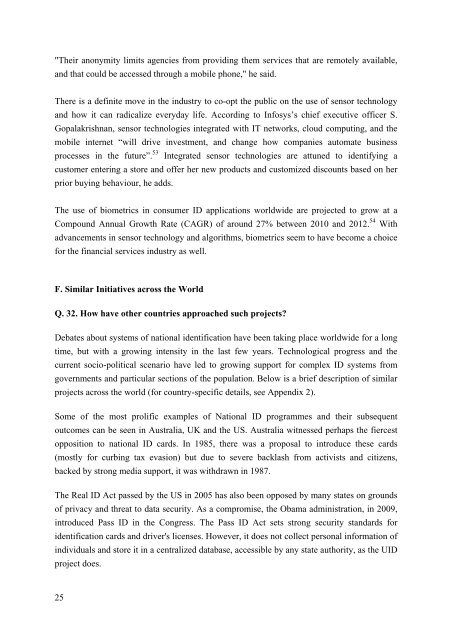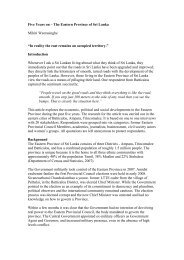UID For Dummies (PDF) - Countercurrents.org
UID For Dummies (PDF) - Countercurrents.org
UID For Dummies (PDF) - Countercurrents.org
You also want an ePaper? Increase the reach of your titles
YUMPU automatically turns print PDFs into web optimized ePapers that Google loves.
"Their anonymity limits agencies from providing them services that are remotely available,<br />
and that could be accessed through a mobile phone," he said.<br />
There is a definite move in the industry to co-opt the public on the use of sensor technology<br />
and how it can radicalize everyday life. According to Infosys’s chief executive officer S.<br />
Gopalakrishnan, sensor technologies integrated with IT networks, cloud computing, and the<br />
mobile internet “will drive investment, and change how companies automate business<br />
processes in the future”. 53 Integrated sensor technologies are attuned to identifying a<br />
customer entering a store and offer her new products and customized discounts based on her<br />
prior buying behaviour, he adds.<br />
The use of biometrics in consumer ID applications worldwide are projected to grow at a<br />
Compound Annual Growth Rate (CAGR) of around 27% between 2010 and 2012. 54 With<br />
advancements in sensor technology and algorithms, biometrics seem to have become a choice<br />
for the financial services industry as well.<br />
F. Similar Initiatives across the World<br />
Q. 32. How have other countries approached such projects?<br />
Debates about systems of national identification have been taking place worldwide for a long<br />
time, but with a growing intensity in the last few years. Technological progress and the<br />
current socio-political scenario have led to growing support for complex ID systems from<br />
governments and particular sections of the population. Below is a brief description of similar<br />
projects across the world (for country-specific details, see Appendix 2).<br />
Some of the most prolific examples of National ID programmes and their subsequent<br />
outcomes can be seen in Australia, UK and the US. Australia witnessed perhaps the fiercest<br />
opposition to national ID cards. In 1985, there was a proposal to introduce these cards<br />
(mostly for curbing tax evasion) but due to severe backlash from activists and citizens,<br />
backed by strong media support, it was withdrawn in 1987.<br />
The Real ID Act passed by the US in 2005 has also been opposed by many states on grounds<br />
of privacy and threat to data security. As a compromise, the Obama administration, in 2009,<br />
introduced Pass ID in the Congress. The Pass ID Act sets strong security standards for<br />
identification cards and driver's licenses. However, it does not collect personal information of<br />
individuals and store it in a centralized database, accessible by any state authority, as the <strong>UID</strong><br />
project does.<br />
25










